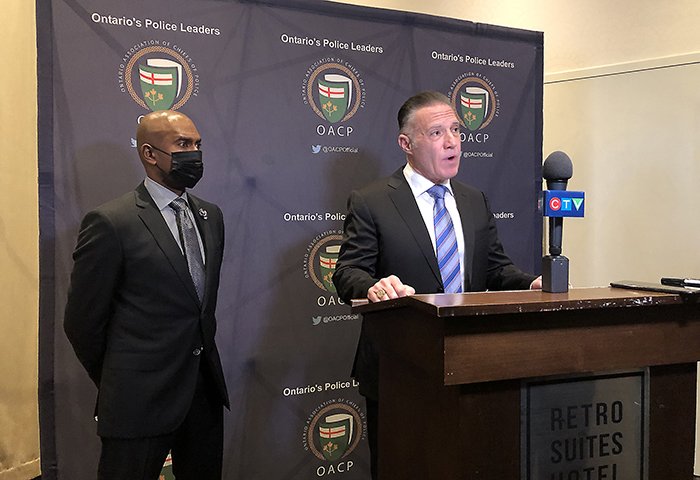
Body cams, costs of COVID-19 and more up for discussion
By Pam Wright
Local Journalism Initiative Reporter
Chatham-Kent police chief Gary Conn doesn’t anticipate a reduction in local police services – despite increased pressures brought on by ballooning inflation and COVID-19.
Conn discussed the budget and other policing issues Monday at Retro Suites as part of an Ontario Association of Chiefs of Police conference.
It’s the first in-person meet to be held in two years.
Conn, currently serving as OACP president, believes it will be “more challenging” financially for Ontario policing across the board because of COVID-19 and other issues.
Conn said dealing with the virus has “drained” resources, as officers and administrators grapple with COVID-19 protocols while trying to keep themselves and the public safe.
However, he said Monday’s in-person event, which drew police chiefs from around the province, signals a return to “normalcy.”
Conn said a lot has been learned dealing with the pandemic in the past two years.
Other issues were discussed with reporters at the scrum, including the advancement of technology.
The changes mean that officers will one day be wearing body cameras.
Locally, Conn said a three-to-six-month body-cam pilot project is planned for Chatham-Kent for 2022, with a further demonstration rollout in 2023.
Some “robust conversation” on the issue was to take place at the conference, Conn noted, with bigger police services that are already using body cams able to share best practices.
The cost of that program is unknown, but Conn admitted it will be expensive.
Complex social disorders and mental health, including addictions and homelessness, continue to be a top priority for police, Conn said, but noted the issues are not unique to Chatham-Kent.
Locally, the Chatham-Kent Police Service is planning to add a second team to its well-established mobile crisis unit, which includes a specially trained officer and psychiatric nurse who respond to mental health calls.
When asked directly if the CKPS will need to reduce services due to budget constraints, Conn said it’s not a concern at present.
“We’re not there yet,” Conn explained, adding he doesn’t expect policing levels to change.
When asked about revamping the rules in the Ontario Police Services Act around suspended police officers pulling down full wages while on leave, Conn said the organization is trying to change that.
He called it an “antiquated portion” of the Police Services Act – one that’s stayed the same for 31 years.
“That is still a pressing issue for us and we’re continuing that work,” Conn said.
Peel Regional Police Chief Nishan Duraiappah, first vice chair of the OACP, shared the podium with Conn. He’s also head of the agency’s Anti-Racism Working Group.
Addressing systemic racism is a priority issue for all police services, Duraiappah explained, adding police need to be leaders in this area.
“We as police leaders are responsible for our sector and we need to be accountable to the public we serve,” Duraiappah told the media.
He said some “fulsome work” is planned for 2022 to make changes.
“It’s a difficult narrative,” said Duraiappah, adding all institutional systems are affected by systemic racism.
“One of the roles is to look within and see if there are changes we can make to serve the public.
“That’s one of the commitments we have taken on in the OACP.”
Conn said a myriad of subjects were to be covered in the two-day event, noting that as president he strives to bring back ideas and solutions to problems to the community of Chatham-Kent.






